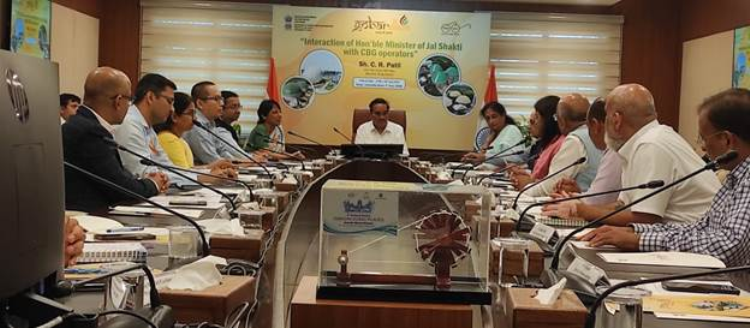In a significant effort to assess progress and gather feedback on the GOBARdhan Initiative, Union Minister for Jal Shakti, Shri C. R. Paatil, conducted an interaction in New Delhi with Compressed Biogas (CBG) producers and key stakeholders from the sector. This initiative underscores the Government's commitment to transforming organic waste into valuable resources such as CBG and organic manure through sustainable waste management practices.
The event brought together various stakeholders including representatives from ministries, CBG operators, and leading organizations. The discussion aimed to foster collaboration, address challenges faced by CBG producers, and reinforce the government's support for innovative waste management solutions.
Shri Paatil acknowledged Prime Minister Shri Narendra Modi's vision behind the GOBARdhan initiative, highlighting its role in sustainable development and the circular economy. He emphasized that by converting organic waste into resources, India not only protects the environment but also generates employment and promotes public health.
During the interaction, CBG operators voiced concerns about excessive chemical fertilizer use and the absence of a well-defined mechanism for trading carbon credits in the CBG sector. They stressed the importance of promoting bio-fertilizers like Fermented Organic Manure (FOM) and Liquid Fermented Organic Manure (LFOM) to restore soil health, which is crucial for sustainable agriculture. The operators requested more farmer education programs on bio-fertilizers and urged the government to expedite the establishment of mechanisms for trading carbon credits to incentivize the sector further.
The CBG industry appreciated the government's efforts and cited the significant increase in interest and participation in the sector, buoyed by initiatives like the establishment of 500 new waste-to-wealth plants announced in the Union Budget 2023-24. Currently, 113 CBG plants are operational, with 667 plants in various stages of development and 171 plants under construction, indicating robust growth and investment in the sector.
Key highlights and initiatives under the GOBARdhan Initiative include:
Market Development Assistance (MDA) to promote organic fertilizers from GOBARdhan plants.
Financial assistance schemes for pipeline infrastructure development and biomass aggregation machinery procurement.
Financial support for CBG capacity projects and assured offtake through the SATAT Scheme by Oil Marketing Companies (OMCs).
Excise duty exemption for CBG blended in Compressed Natural Gas (CNG) and CBG blending obligations in CNG and PNG consumption.
Additionally, various ministries such as Ministry of New and Renewable Energy, Ministry of Agriculture and Farmers Welfare, Ministry of Housing and Urban Affairs, and others have rolled out supportive schemes and initiatives under the GOBARdhan framework to promote bio-CNG projects, integrate bioslurry in fertilizers, and provide financial incentives for setting up CBG plants.
The Minister concluded by thanking CBG stakeholders for their inputs and assured continued government support to develop the sector into a significant contributor to India's sustainable development goals.











